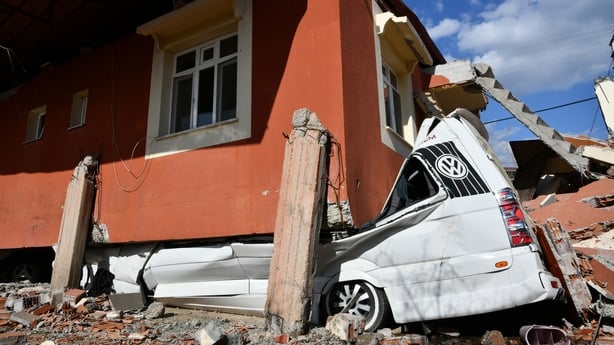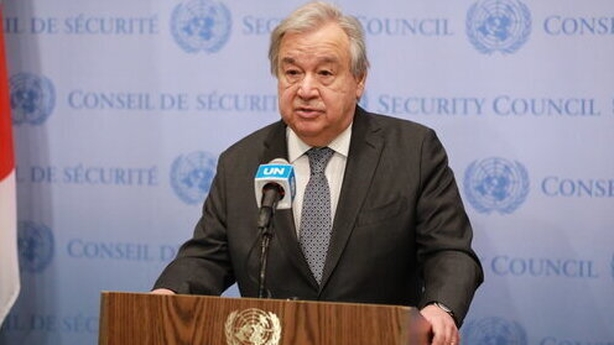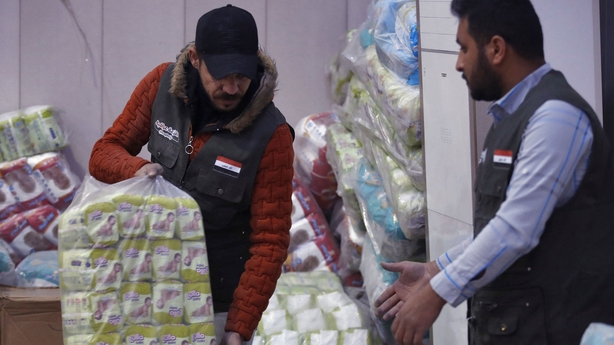Two women have been pulled from the rubble in Turkey's southern city of Kahramanmaras, even as hopes to find survivors from last week's devastating earthquake dwindled and the focus switched to giving survivors some relief.
Rescuers could be seen applauding and embracing each otherin a video posted to social media as an ambulance carried away a 74-year-old woman rescued after more than nine days trapped in rubble.
Earlier in the day, a 46-year-old woman was rescued in the same city, close to the epicentre of the quake.
The combined death toll in Turkey and Syria has climbed over 41,000, and millions are in need over humanitarian aid, with many survivors having been left homeless in near-freezing winter temperatures.
Rescues are now few and far between.
In hard-hit Kahramanmaras, where the earthquake forced hundreds of families to live in tents erected in a stadium in freezing temperatures, empty buildings with their walls ripped open showed the power of the earthquake.
With much of the region's sanitation infrastructure damaged or rendered inoperable by the earthquakes, health authorities face a daunting task in trying to ensure that survivors now remain disease-free.
On a ferry being used to treat survivors in Turkey's southern port of Iskendurn, pharmacist Jin Ozsaygili also worried about health risks.
"We expect cholera and typhoid epidemics. In order toprevent these diseases, the debris should urgently be removed, calcification and cleaning should be completed, but we aretrying our best (to prevent outbreaks) as this is not possible at the moment," Mr Ozsaygili said.

Meanwhile, the government encouraged people to go back home, if and when authorities have deemed their building safe, "in order to start getting back to normal," Tourism Minister Nuri Ersoy told a news conference in Malatya, some 160 km from the epicenter of the earthquake.
"We will quickly demolish what needs to be demolished and build safe houses," Turkey's Environment and Urbanisation Minister Murat Kurum tweeted.
On a ferry being used to treat survivors in Turkey's southern port of Iskendurn, pharmacist Jin Ozsaygili also worried about health risks.
"We expect cholera and typhoid epidemics. In order toprevent these diseases, the debris should urgently be removed, calcification and cleaning should be completed, but we aretrying our best (to prevent outbreaks) as this is not possible at the moment," Mr Ozsaygili said.
Meanwhile, the government encouraged people to go back home, if and when authorities have deemed their building safe, "in order to start getting back to normal," Tourism Minister Nuri Ersoy told a news conference in Malatya, some 160 km from the epicenter of the earthquake.
"We will quickly demolish what needs to be demolished and build safe houses," Turkey's Environment and Urbanisation Minister Murat Kurum tweeted.
We need your consent to load this rte-player contentWe use rte-player to manage extra content that can set cookies on your device and collect data about your activity. Please review their details and accept them to load the content.Manage Preferences
'Really tragic'
Across the border in Syria, relief efforts have been hampered by a civil war that has splintered the country and divided regional and global powers.
Civil war enmities have obstructed at least two attempts to send aid across frontlines into the hard-hit northwest, but an aid convoy reached the area overnight.
Organised by Arab tribes, trucks loaded with blankets, food, medical supplies and tents arrived overnight in the insurgent-held rebel northwest from a region controlled by the Kurdish-led Syrian Democratic Forces, a Reuters witness saw.
More aid was being collected, said Hamoud Saleh al-Darjah, an organiser.
"This isn't the last campaign," he added.
But some in the region worried about how they could start again.
"The situation is really tragic," Abdulrahman Mohammad, a displaced Syrian originally from the neighbouring province of Aleppo, said in Idlib, where many had found refuge in the past decade from other war-torn provinces.
Parts of the provinces of Idlib and adjacent Aleppo held by Turkey-backed rebels suffered the bulk of the quake's casualties in Syria: over 4,400 of a death toll of more than 5,800, according to the United Nations and government authorities.
"Anyone who is working as a labourer and renting a house ... If you need $10 a day in expenses and you can barely get that –how are you supposed to rebuild?" Mr Mohammad said.
Hassan Mohamed, a civil defence volunteer, said that while efforts to find survivors in the most badly hit areas in northwest Syria had finished, rescue workers were still deploying in response to reports of people missing.
"We are also going to areas where there has been no internet," he added.
Some have had lucky escapes.
In Syria's Mediterranean town of Jableh, Um Kanan recounts how she woke her three children and rushed them to a small closet in her bedroom for shelter, along with a collection of family photos and documents, when the earthquake hit.
The force of the quake brought their fourth floor apartment in crashing to the ground, but the four survived.
"I kept thinking to myself: 'Can it be? Did the building just fall down? Is this a dream?' I tried to move but I couldn't," she said.
"The children and I, by some miracle, we ended up in this small space that I had left empty."

UN appeals for nearly $400 mn for Syria quake victims
The UN yesterday launched an appeal for $397 million to help earthquake victims in Syria.
Secretary-General Antonio Guterres, announcing the appeal at the UN headquarters in New York, said the funds would bring "life-saving relief" for nearly five million Syrians and would cover a period of three months.
He added that the world body was in the "final stages" of a similar appeal for Turkey.
"One week after the devastating earthquakes, millions of people across the region are struggling for survival, homeless and in freezing temperatures. We are doing all we can to change this. But much more is needed," Mr Guterres pleaded.
He called on member states to "fully fund this effort without delay and help the millions of children, women and men whose lives have been upended by this generational disaster."
Mr Guterres also urged that aid workers be allowed to operate freely in Syria, already racked by 12 years of civil war.
Activists and emergency teams in Syria's northwest have decried the slow UN response to the quake in rebel-held areas, contrasting it with the planeloads of humanitarian aid that have been delivered to government-controlled airports.

Before the earthquake struck, almost all of the crucial humanitarian aid for the more than four million people living in rebel-controlled areas of northwest Syria was being delivered through just one crossing.
Mr Guterres announced on Monday that Syrian President Bashar al-Assad has agreed to open two more border crossings from Turkey to northwest Syria to allow in aid.
"The human suffering from this epic natural disaster should not be made even worse by manmade obstacles - access, funding, supplies," said the UN chief.
"Aid must get through from all sides, to all sides, through all routes -- without any restrictions."
The United Nations has already provided $50 million through its central emergency response fund.
The first 'container city' for those displaced by the earthquake in both countries could open "as early as this week", a member of the United Nations Disaster Assessment and Co-ordination team said.
Speaking on RTÉ's Morning Ireland, he said the decision to stand down search and rescue teams is a difficult one.
"I think they are systematically going through each of the rescue sites and ensuring that everything that can be done has been done.
Mr Lambkin said "massive mental health care needs" are being highlighted because of the "trauma of the population" including people "who will perhaps never again see themselves living in an apartment block".
"We have populations that are sleeping in their cars because they refuse to go back into buildings," he said.
"All of these different typologies of displacement, vulnerability, all need to be addressed through a comprehensive plan."

